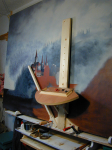Browse articles by topic: Art lessons . BenHaven Archives . Blank art diaries . Fine art photography . Framing . Illustration . Inspiration and creativity . Isles of Rune . Limited Editions Collection . My Fathers Captivity . News . Novellas . Oil paintings and prints . Operations announcements . Orders and shipping . Overview . Portfolios . The Papers of Seymore Wainscott . Project commentaries . Recipes by Nancy Young . Recommended reading . Recommended viewing . Temple artworks . The Storybook Home Journal . Tips and techniques . Tools supplies and operations

By Al R. Young Rending the Veil was painted by the artist in the studios at Ben Haven.
dimensions (unframed width x height)
48 in. x 84 in.
support
Panel
milestones
Painting completed — 2021 May
Initial imprimatura of sky and land completed — 2020 January
Initial imprimatura of the city completed — 2018 June
Begins the imprimatura — 2015 May
Completes preparation of the support — 2015 May
Work begins on the composition for the painting — 2015 April
Based on regular entries in the project journal for this painting, creation of the artwork involved approximately 165 painting sessions (from composition and panel preparation to completion of brushwork)... Read more »
Tags: 3.00.0306.010, 2021, Project commentaries, Tips and techniques, Tools supplies and operations
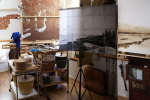
By Al R. Young
This article is essentially an annotated snapshot of studio workflow (for my painting projects only) over the decade in which I worked on the following three paintings:Trailhead
Rending the Veil
Lunta jo VanoeStudio workflow and space utilization are also discussed in Yachting, inconveniences and studio workflow
There is a great deal more to painting, than painting, as everyone knows who maintains a studio and works on more than one painting project at a time. These three projects, for example, combined to become a crucible in which my confidence as an artist, capable of starting and completing self-funded projects, was actually threatened... Read more »
Tags: 2021, Project commentaries, Tips and techniques, Tools supplies and operations

By Al R. Young In both eastern and western traditions, one problem is at the intersection of concept and image: How to get the image from the artist to the surface or support on which the image will reside. At a glance, this may sound like a matter so simple, so obvious, so basic that to focus on it is unnecessary. But in the eastern tradition, an artist first assimilates the subject. If, for example, the subject is landscape, the artist immerses him or her self in the subject for the purpose of putting the subject inside one's self; comprehending its essence or essentially becoming the subject... Read more »
Tags: 3.00.0306.010, 3.00.0307.010, 2021, Project commentaries, Tips and techniques, Tools supplies and operations
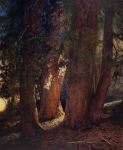
By Al R. Young Trailhead was painted by the artist in the studios at Ben Haven.
dimensions (unframed width x height)
47 in. x 60 in.
support
Panel
milestones
Painting completed — 2021 July
Wildfire devastates the Nebo area — 2018 September
Begins color work — 2016 July
Monochromatic imprimatura completed — 2015 May
Embarks on another imprimatura, on the same ground, using Burnt Sienna — 2015 January
Scrapes away all imprimatura done to date — 2015 January
Discovers that the imprimatura is not bonding with the ground — 2015 January
Experiments with using pottery shapers (rubber wedges) to paint miniatures — 2014 December
Discovers that insect infestation has destroyed the Nebo trailhead — 2012 June
Visits trailhead for another photo shoot, to obtain high-resolution photos — 2012 June
Embarks on painting composition — 2012 February
Takes referent photograph during visit to Nebo trailhead in the Wasatch Mountains — 2003 October
Based on regular entries in the project journal for this painting, creation of the artwork involved approximately 147 painting sessions (from composition and panel preparation to completion of brushwork)... Read more »
Tags: 3.00.0307.010, 2021, Project commentaries, Tips and techniques, Tools supplies and operations

By Al R. Young This handmade, original oil painting was created by the artist in the studios at Ben Haven.
It is part of The Isles of Rune Project, an ongoing creative endeavor of the Artists of Al Young Studios.
Read more . . .
milestones
Painting completed — 2021 July
Final composition (no. 14) of background implemented — 2021 May
Starts painting with new toxin-free palette — 2019 May
Brushwork begins — 2018 October
Prepares the support and ground — 2018 July
First composition completed — 2018 March
Dress and cloak completed — 2017 September
Preliminary photo shoot (first of 5) — 2017 July
Research and planning for costumes and shoots — 2017 June
Based on regular entries in the project journal for this painting, creation of the artwork involved approximately 142 painting sessions (from composition and panel preparation to completion of brushwork)... Read more »
Tags: 3.00.0302.010, 2021, Project commentaries, Tips and techniques, Tools supplies and operations
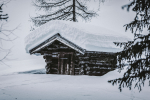
By Al R. Young I was in college, majoring in communications, when someone pointed out that some peoples dwelling in or near the northern polar climes have fifty words for snow because they have to "know their snow" in order to survive with it. Only recently, however, did I learn that in compiling a Scots thesaurus, researchers have actually logged 421 terms applicable to snow. (I can only speculate that somewhere in the history of Scots a significant part of the population shared my views of snow... Read more »
Tags: 2020, Tips and techniques, Tools supplies and operations

By Elspeth C. Young By Al R. Young
NOTE: This article focuses only on oil painting and, more specifically, oil painting as we approach the medium. While some of the statements, here, might be applied to other media, such as air brushing, acrylics, watercolors, etc., such application is entirely the responsibility of the reader. We also caution that even applying the following statements to oil painting is something for which the reader is also ultimately and totally responsible... Read more »
Tags: 2020, Tips and techniques, Tools supplies and operations

By Al R. Young
The panel-support accessory shown in the following photographs enables the A-frame easel to
accommodate a greater diversity of painting-support sizes, and is better adapted to Elspeth's needs.
The framework is 40 3/8 in. wide and 94 7/8 in. tall. It is made almost entirely of alder, milled in the Studios' shop. The arms by which C-clamps
secure the framework to the original A-frame easel, are 30 in. long. The ends of the arms at the C-clamps are free of the original easel, which provides maximum flexibility in
positioning the framework... Read more »

By Al R. Young The tray (ledge) used on the $10 easel is secured to the easel by means of C-clamps that hold it in place against the vertical 2x10s (i) in the following diagram.
The following photograph shows the tray turned backwards (its back faces the camera) to show the metal tabs by means of which C-clamps (positioned at B and C) hold it against the 2x10s. The metal tabs at B align with the inner face of the 2x10s. The metal tabs at C make it possible to secure the tray to the cutwork profile at the bottom ends of each 2x10 (i in the diagram, above)... Read more »

By Al R. Young Just like the willful professors in competing courses during any given semester, painting projects don't always stay in line or behave well if they do. And sometimes an artist's ability to respond to conflicting demands depends not so much on stamina, speed, or skill as on whether studio space or the way the studio is organized can respond.
The bedpost easel--so named because the horizontal bar at its center was originally a bedpost)--grew out of the need to use the $10 easel to work simultaneously on two paintings... Read more »

By Al R. Young Although I enjoy the flexibility of positioning allowed by my aspen mahl stick, I sometimes spend several hours engaged in very close work on a relatively small area of a painting. For such sessions, I enjoy the freedom of a clamp-on hand rest such as the accessory shown, here, designed specifically for the $10 easel.... Read more »

By Al R. Young I made this brush holder for painting sessions that involve only a few small brushes. Since the palette mounted on the pallette-cart is topped with glass, a suede or nap finished piece of leather is glued to the base of the holder to keep it steady.... Read more »
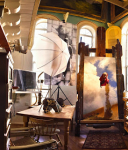
By Al R. Young The flood lights mounted to a track on the west wall of the studio augment natural light pouring in through the two windows on the north and the two windows on the east walls of the studio. Archways in the lower half of the west wall also admit light into the studio. The studio ceiling is two stories high, and light at the upper level pours in from interior archways on the west wall as well as an exterior window on the south.
We use a natural-light flood in each of the three track-mounted fixtures... Read more »
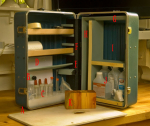
By Al R. Young Originally, this kit was purchased as a field laboratory for performing soil tests, but that was a very long time ago. It now serves our plein air needs as well as site-visits required in addressing issues that cannot come to the studio.
A This gesso-coated piece of Masonite is a palette, which is one reason it has a beveled thumb-hole in it (just in front of K). A small hole on each long-side of the palette matches the threaded bolts mounted into the wood blocks at B and E... Read more »

By Elspeth C. Young
For the rosemalling to be executed on the ornamental panels for the Stein Eriksen Lodge Deer Valley conference room renovation project, we proposed the following design criteria:
Avoid a visually dense design (i.e., horror vacui).
Create a design that balances boldness, strength, and sinuousness with traditional colors and contours of stylized botanical subjects.
Create botanical motifs from local flora instead of merely using traditional design elements... Read more »
Tags: 2013, Tips and techniques, Tools supplies and operations

By Al R. Young Production of rosemalling panels for the Stein Eriksen Lodge Deer Valley conference center renovation project involved the following general steps, for which Ashton was primarily responsible. Much of Ashton's involvement in this part of the project revolved around the spray tent set up in the studio shop for the project.
The rosemalling panels moved through the following process in batches of about a dozen.
Quality assurance (QA) review of each rough-cut panel
Fine-cut each panel to architect's specifications
Scuff-sand display-surface of each panel
Vacuum and rag each panel
Label panel-back for tracking during production
Spray with two coats of interior latex-and-primer
Stencil-spray ornamental liner
Hand touch-up ornamental liner
Dry-brush and rag acrylic glazes to antique the image
Apply spatters and drips
The rosemalling panels were then turned over to Elspeth for hand painting in her studio... Read more »

By Ashton R. Young
Preventing paint-bleeds when using a stencil is almost always a problem and there are almost as many recommendations for dealing with it. The following method suited the parameters of our particular project, which included such considerations as paint viscosity, under-layer absorption, the line quality of the image to be sprayed, the scale of the image, and the time available for completing the work.
The following series of photos shows the main steps in using the stencil and hand-press... Read more »
Tags: 2013, Tips and techniques, Tools supplies and operations

By Al R. Young When we received a commission to paint two fairly large, horizontal landscape paintings for the renovation of the Stein Eriksen Lodge Deer Valley conference center renovation, I decided to construct a framework that could be clamped, horizontally, to the $10 easel and provide backing for the panels while I worked on them. I might have painted the two landscapes on the landscape easel, but glare is a perennial problem with that easel and I needed it as a drying rack so that I could work on both paintings simultaneously... Read more »
Tags: 2013, Inspiration and creativity, Tools supplies and operations

By Al R. Young The work flow and space involved in creating ornamental panels for the Stein Eriksen Lodge Deer Valley conference center renovation project required that we create a free-standing rack on which painted panels might dry in the studio where they were painted. This rack temporarily increased the drying-shelf capacity of that studio. The goal was to uncouple the rosemalling from the spray tent so that rosemalling could be completed simultaneously with work under way in the tent.
The following photographs show the rack built for the purpose... Read more »

By Al R. Young The simple shelving in the following photograph of the spray-tent in the shop, is anchored at the top to the ceiling joists and, at the base, to the 1x2 to which the plastic sheeting of the partition is anchored. The 1x2 running through the top brace of the vertical bracket-support is part of the diptych easel. The 1x3 on which the small piece of insulation rests is part of a ceiling track permanently mounted to the ceiling. Neither the track nor the easel component has anything to do with supporting the tent... Read more »
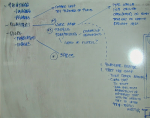
By Al R. Young It's usually a really super project if completing it involves creating more of the studio just to be able to create the artwork. That was the case with the commission to produce rosemalling panels and a scenic tetraptych for the Stein Eriksen Lodge Deer Valley conference center renovation project.
Having reviewed the requirements for those facets of the project for which we were responsible, and having formulated design specifications for the deliverables, the next major step was to finalize space and equipment configuration at the Studios for completing the work... Read more »

By Al R. Young Two 2x6 scraps were glued together and then holes were drilled on a drill press to make this brush and tool holder.
Earlier brush holders, such as the pedestal and spindle brush holders, worked well enough, but took up a good deal of space for the number of brushes they could hold, and required hitting a target of two separate holes for the brush handle. Consequently, I have switched to using brush holders that provide greater brush density and a single shaft in which the brush handle rests... Read more »
Tags: 2013, Inspiration and creativity, Tools supplies and operations

By Al R. Young The plight of Richard III during the Battle of Bosworth Field applies equally to the creation of original artwork (probably to the creation of anything original) when that creation occurs on the frontier of available equipment and funds. And perhaps nothing on the studio frontier--at least in my experience--is more diverse and ubiquitous in its uses than the clamp. C-clamps, bar clamps, pipe clamps, spring clamps, binder clamps, film clips, even clothespins are so important that I suspect trying to be a studio artist without them would be almost as difficult as trying to paint without brushes... Read more »

By Al R. Young First, the story problem:
In the fall of 2012, the Studios was commissioned to paint a tetraptych consisting of individual images measuring 13.5 in. wide x 186.5 in. high. The tetraptych was supposed to present a scenic image, not necessarily a continuous image, as though the entire image could be assembled by a contiguous arrangement of the panels, but coherent in the sense that windows onto a particular scene present portions of the same.
We decided to use Masonite as the support... Read more »
Tags: 2013, Inspiration and creativity, Tools supplies and operations

By Al R. Young The palette cart is one of three unassembled, metal-frame trolleys that came to the Studios several years ago from a furniture liquidation sale. The cart remodeling described in this post results from the intervening years of its use -- usually an excellent source of the best ideas.
In the following photograph, the bottom shelf of the trolley stores accessories like brush holders, wooden blocks, and easel attachments. The middle shelf is home to a basket of clean rags and a wastebasket with a lid (oiled and waxed)... Read more »

By Al R. Young Sometimes the creative process seems to backfire, even though no signs of difficulty appear along the way. One such occurrence involved my desire to create a brush holder out of an old black piano leg and two wall plaques.
When I stepped into the shop to embark on the project, I simply wanted to make a brush holder that would accommodate as many brushes as I might use during a long and demanding painting session, and I had nothing more than a hunch that the piano leg--that had been in one of the scrap buckets long enough for me to despair of finding a good use for it--would be a good place to start... Read more »
Tags: 2013, Inspiration and creativity, Tools supplies and operations

By Al R. Young We made our own whiteboard from two, 4 ft. x 8 ft. acrylic-coated hardboard panels. The space for which the double-sided whiteboard was designed allowed for an assembly suspended from the ceiling, hence the two whiteboards.
To keep the supple boards from bouncing back in response to the pummeling of handwriting, we used 1x2s to construct a 4 ft. x 8 ft. framework and sandwiched it inside the two whiteboard panels, one on each side of the framework, back-to-back. Both panels and framework were then encased in a frame in which thin molding holds the panels and framework in place... Read more »
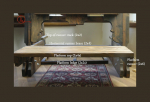
By Al R. Young One of the first major additions to the $10 easel, several years ago, was a retractable platform that serves as a step when the easel is used for a tall painting, and as a bench when we need more seating in the studio.
The platform rests on the top of the foot at the base of each side of the easel. The top of the track for the platform consists of a 2x2 (labeled "top of runner track" in the foregoing photograph). Note that the runner track shown, here, only allows the platform to be pulled out about 18 in... Read more »

By Al R. Young The $10 Easel in the studio has served well as the workhorse for painting projects since Ashton and I built it in September 2006. And, like most of our do-it-yourself pieces of studio equipment, we keep modifying or adding accessories as projects require. This post talks only about the easel's basic construction. Future posts describe the add-ons.
In the early fall of 2006, we ripped up the carpet, padding, and tack-strip in the studio, kitchen, and pantry. With dislocated furniture and forlorn kitchenware piled throughout the rest of the main floor as though we enjoyed living inside a garage sale, we took a belt sander to the exposed subfloor and spread a frosting of dust over the spectacle... Read more »

By Al R. Young Like the vernacular style in architecture, do-it-yourself tends to become more and more organic as time passes because modifications and repairs accumulate. Perhaps nowhere in the studio is this more evident than the Landscape Easel on the south wall.
In fact, in 1992, the easel didn't even start out as an easel, but as a set of two, 10 ft. long, wall-mounted drying shelves supported by homemade corbels. A 1x8 served as the bottom shelf in the set. The top shelf was a 1x6 nearly 3 ft... Read more »

By Al R. Young
These are the tenets of our brush-buying:
Ignore categories
Buy in person
Buy quality
Ignore categories
I frequently oil-paint with watercolor brushes. In fact, I would oil paint with a broom if I thought it would give me the result I wanted.
However, it was not always thus. For someone who dreaded school every day of the long years of secondary education, lest an unwitting infraction of an unwritten rule result in a trip to the principal's office, the categories in which paint brushes are typically arrayed in art supply inventories implied boundaries not to be breached... Read more »
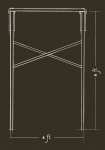
By Al R. Young I built the Diptych Easel several years ago in order to complete a commission to create an entablature featuring a diptych consisting of two, 4 ft. x 8 ft. painted panels. Even though the easels were created for a specific commission, the design can be modified or adapted as needed.
Each of the two matching easels in the set leans against the wall. And since the lightweight framework of each easel is (when in use) clamped to the back of a 4 ft. x 8 ft. sheet of 5/8-in. plywood, the plywood doesn't so much rest on the easel as become part of its structure and stability... Read more »

By Al R. Young January 6th is an anniversary at Al Young Studios; the anniversary of my first attempt to set aside and equip a place dedicated to creating artwork. We celebrate the beginning of that ongoing effort because the task of configuring, equipping, maintaining, using, and improving a fine art studio is an amazingly multifaceted and demanding endeavor; at least, it has proven so for us. It's an endeavor that never ends.
My journal entry for January 6, 1981, says simply: "This afternoon, I started building a drafting table – which I hope to complete tomorrow... Read more »
Tags: 2012, Inspiration and creativity, Studios anniversaries, Tools supplies and operations

By Al R. Young Building studio equipment isn't always an option, but when it is, it can save a great deal of money and provide custom solutions that can be adapted to the many ways in which technique and projects change over the years.
Of the many easels that are part of the studio's equipment, only a handful were purchased new, a few of those came to us second- or third-hand, and the remainder were designed and built in the studio. Purchased easels include two of the suitcase-style travel models that can be set up easily enough, but require graduate study in order to reconstitute as a suitcase... Read more »

By Elspeth C. Young
Since early February of this year, Elspeth has been working on a painting of Mary Elizabeth and Caroline Rollins—two pioneer sisters who bravely saved what they could from a violent mob who destroyed the early Church's printing press July 20, 1833. The painting depicts both teenage girls with the precious galley pages of The Book of Commandments which they salvaged while they were pursued by armed members of the mob. In desperation they sought refuge in a nearby cornfield--an occurrence Mary movingly described in her published autobiography... Read more »
Tags: I Will Uphold Thee, 2011, Costume and props, Pioneer Art Collection, Project commentaries, Tools supplies and operations
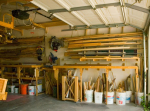
By Al R. Young
The wood-storage easel in the shop is mounted to the wall above the south side of the chop table. Two kinds of materials are stored on it: Moudlings and sheets. The mouldings are arranged on wire shelves attached to the face of the ribs of the easel. Medium and large sheets of plywood, hardboard, and other materials (removed for this photo) rest on the ledge of the easel and lean against the wire shelves for the mouldings.... Read more »

By Al R. Young
Most of the scrap storage in the shop is bin-based, and, as such storage goes, it's quite effective, but the scrap buckets under the shop tables and the wheelbarrows under the workbench never have worked well for the thin, long, and often flimsy stuff that gets left over from ripping, not to mention the small stick-like stuff that seems to accumulate when no one is watching. The wire baskets not only accommodate these leftovers, but are surprisingly convenient for searches because it's easy to see what's there... Read more »
Tags: 2011, Inspiration and creativity, Tools supplies and operations

By Al R. Young The tombstone, at Monticello, marking the grave of Thomas Jefferson, bears the inscription dictated by the creative genius, whose diversity of interests, pursuits, and accomplishments remains legendary.
Every human being accomplishes things in life for which--like Mr. Jefferson--they might wish to be remembered, and ever since our visit to the Sage's home I have mused from time to time (sometimes seriously and sometimes in a more jocular frame of mind) what might be the three things I would dictate as an epitaph... Read more »
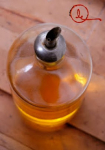
By Al R. Young Often in life, the "playing" part is a good deal more congenial than the "cleaning-up" part, and oil painting is hardly an exception. Just when you're too whacked to paint any longer, the tools of the trade can require a rather onerous amount of scraping, swishing, rinsing, and scrubbing to stand ready for future painting sessions. At our Studio, we've found that the pain has been eased considerably by two readily-available cleaning agents not always associated with artistic endeavors; and we've enjoyed their time-and-labor-saving benefits for a long time... Read more »

By Elspeth C. Young One thing I've learned over recent years is that no painting is finished when it's done. The subject matter and the symbolism a painting contains never ceases, as long as there are real people looking at it. In fact, the essays accompanying our paintings don't even begin to really tell the "story in the painting," since that "story" adapts to meet the gaze of those who bring new perspectives, experiences, and insights to that image day by day... Read more »
Tags: For This Child I Prayed, 2011, Costume and props, Tools supplies and operations, Women of the Bible Art Collection

By Elspeth C. Young
At the Studio, we're always looking for another place to store a brush or two. In January, we posted ideas for creating handmade built-in brush holders for Studio convenience. This month, we'll be featuring ideas for free-standing brush holders, perfect for taking to a favorite plein-air painting spot, or grabbing for a day's painting at the easel.
Today, we're including some ideas for "re-purposed" containers, ideal for storing brushes, palette knives, and other studio paraphernalia without the extra cost of holders made expressly for the purpose by art supply vendors... Read more »

By Al R. Young Elspeth is working on a painting of Pilate's wife. Within the composition, the wife of Pilate will be depicted writing the hasty warning she "sent unto him, saying, Have thou nothing to do with that just man: for I have suffered many things this day in a dream because of him" (Matthew 27:19).
In Roman times, it was typical to write messages on wax tablets using a stylus. In preparation for the painting, we have built and decorated a wax tablet of our own, pictured here. We inscribed the wax with a Latin translation of her words (translation courtesy of T... Read more »
Tags: Upon Awakening, 2010, Costume and props, Tools supplies and operations

By Al R. Young Both Al and Elspeth favor M. Graham Walnut Alkyd Medium for use as a drying agent. It's fast drying (one to two days in our dry desert climate) without causing the oil paints to lose their capability to be worked using wet-in-wet techniques, neither does it strip the texture of the paint down to an acrylic-like consistency as some drying agents seem to do.
Our favorite supplier for the medium is Merri Artist in Oregon because they carry the gallon container (to say nothing of their excellent customer service)... Read more »

By Al R. Young Twenty years ago, while on a walk in the mountains, we found the aspen branch that has served ever since as a mahl (or painter's) stick. The stick enables the artist to improvise a hand-rest almost anywhere over the surface of a painting so that while holding one end of the stick and resting the other end on the painting, the easel, or somewhere else, the artist can hold and use a brush or another tool with the other hand.
Typically, the protective leather pouch at one end of the implement completely covers the end of the stick to protect the surface of the painting when the stick is placed against it... Read more »

By Al R. Young
This is one of the oldest brush holders in the studio, and is among the longest-lived pieces of equipment that has not undergone a make-over. As I mention in connection with the wood-block brush holder, I have moved to a somewhat different design in terms of brush holders.... Read more »
Tags: 2010, Inspiration and creativity, Tools supplies and operations
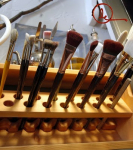
By Al R. Young Most features of the studio are custom made by Al to fit the techniques and work habits of each artist at Al Young Studios. Each holder shown here has stood up to the trial-and-error test of years of professional painting. Brush holders are as individualized as the artists who use them. We hope these ideas help in the search for solutions that fit your needs.
The brush holder pictured above is mounted on the wall next to the 50 in. x 55 in. easel on the studio's east wall. The natural-wood portion of the brush holder is actually portable, and sets in a painted wooden compartment... Read more »

By Al R. Young
For Studios projects requiring scaffolding, this painted-wood brush holder was made to simply drop in place on top of the side of the scaffolding (a ProJax Multi-Purpose unit manufactured by bil-jax) that has served very well for quite a few years.
Many of the studio accessories that we have made of wood are painted green. We keep on hand a water-base interior paint that we use to coat the painted accessories, once in a while, so they don't accumulate a lot of paint-spatter... Read more »

By Al R. Young Ideas, presented in the Newsroom, concerning housing, mounting, and accessorizing power tools are not certified in any way as being safe. Before doing anything of this kind--whether or not it involves implementing any of these ideas--consult whatever authoritative sources you need to for the purpose of satisfying yourself that whatever you might choose to do in such regard is safe. The chop table along the east wall of the shop is 18 ft. 8 in. long and 32.5 in. deep. The surface is made of 0... Read more »

By Al R. Young The large tool caddy (trebuchet or catapult) in the shop houses most of our hand tools. The sloping shelves are used either as shelves on which tools are placed directly, or platforms on which wooden boxes (partitioned for specific tools) present their contents ready-to-hand for retrieval without the necessity of rummaging for them. Each sloping shelf is, of course, outfitted with a lip.
We try to ensure that:
Every tool has a place to live whether that place is a slot of its own or whether it shares its space with other tools... Read more »
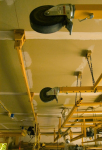
By Al R. Young One of the earliest things we did to the shop was to add ceiling tracks. The tracks are 1x3s attached to the ceiling by brackets, providing 3 in. of space between the top of the rail and the ceiling. The tracks have been used for lighting, a place to clamp things during projects, and for storage of such things as studio equipment, frames, and sheets of insulation.
The ceiling has also been used to store bicycles, signage, and scaffolding.... Read more »

By Al R. Young
In January 1981, I built a drawing table to have a custom workspace dedicated to pencil drawing. The table-top, made from a piece of quarter-inch hardboard laminated to a three-quarter-inch piece of pressboard, had once served as a restaurant table. We had rescued it from a derelict garage a couple of years before, and the 2x4 legs, platform, and under-carriage that I made for it came from the salvage of a stud wall recently removed to extend the second-story studio floor all the way to the eave of an attic roof... Read more »
Tags: 1996, Limited Editions Collection, Lithography, Tools supplies and operations
Browse articles by topic: Art lessons . BenHaven Archives . Blank art diaries . Fine art photography . Framing . Illustration . Inspiration and creativity . Isles of Rune . Limited Editions Collection . My Fathers Captivity . News . Novellas . Oil paintings and prints . Operations announcements . Orders and shipping . Overview . Portfolios . The Papers of Seymore Wainscott . Project commentaries . Recipes by Nancy Young . Recommended reading . Recommended viewing . Temple artworks . The Storybook Home Journal . Tips and techniques . Tools supplies and operations

